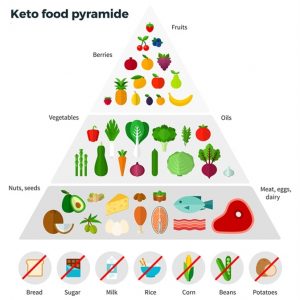When it comes to your body’s metabolism, anything that throws it off balance can be dangerous. One metabolic condition that you should know about is ketoacidosis: an emergency state that can be potentially fatal if left untreated. Though it’s a rare condition, understanding ketoacidosis and the potential signs and symptoms can be life-saving.
Table of Contents
- 1. What is Ketoacidosis?
- 2. Causes of Ketoacidosis
- 3. Risks & Warning Signs of Ketoacidosis
- 4. Treating & Preventing Ketoacidosis
- 5. Staying Alert to the Dangers of Ketoacidosis
- Q&A

1. What is Ketoacidosis?
Ketoacidosis is a serious medical condition that occurs when your body produces too many ketones. A ketone is a byproduct of the breakdown of fats or fatty acids in the liver. When the levels of ketones become too high, your body’s acidity increases. This build-up of toxicity can damage your organ systems and blood vessels.
Ketoacidosis is often seen in people with diabetes, but it can also occur in other cases, such as fasting and alcohol abuse. Uncontrolled levels of ketones can have severe health risks, including:
- AIDS: An increase in ketone production can lead to damage of the primary organs like the liver and kidneys.
- Heart Attack: A high level of ketones can trigger a heart attack, as it can swell the heart and increase the pressure inside it.
- Stroke: Not only does the ketone build-up increase the acidity in your body, it also increases the viscosity of your blood, which increases the risk of having a stroke.
- Coma: Without medical intervention, ketoacidosis can lead to a coma, and even death.
It is important to be mindful of signs and symptoms of ketoacidosis. It is important to be aware of the risks this condition can bring, as it can complicate diabetes and other health conditions. Seek medical attention if you experience any of the following: nausea, frequent urination, rapid breathing, abdominal pain, confusion and fatigue.
2. Causes of Ketoacidosis
Ketoacidosis is a metabolic complication that occurs when the body produces elevated levels of ‘ketones’ or acidic compounds. It is mainly found among people with diabetes. Here’s a look at some of its causes:
- Diabetic Ketoacidosis (DKA): This is the most common cause of ketoacidosis. It occurs when the body can’t produce enough insulin to process glucose. This leads to an accumulation of ketones in the bloodstream, helping to raise the acidity of the blood.
- Alcohol Ketoacidosis: Heavy drinking for prolonged periods of time could lead to ketoacidosis. Alcoholics are at risk developing a type of DKA called alcohol ketoacidosis. This is because the body breaks down and metabolizes alcohol differently from other fuels.
- Starvation Ketoacidosis: When people are deprived of food for an extended time or are fasting to an extreme, their body shifts from burning glucose to burning ketones instead. Such a process can lead to an excessive buildup of ketones, fueling the risk of ketoacidosis.
There are various conditions that also can place individuals at a greater risk of developing ketoacidosis. For instance, people suffering from HIV/AIDS may be at higher risk due to an underlying immune system deficiency. In addition, certain medications may also put you at a higher risk for the condition such as certain classes of diuretics or antibiotics.
3. Risks & Warning Signs of Ketoacidosis
Ketoacidosis (KA) is a serious health condition that needs to be taken seriously, and the best way to do that is to understand what signs to look out for should the condition present itself. While it’s usually related to Type 1 Diabetes, anyone can develop this rare complication from the Keto Diet.
- Increased thirst
- Frequent urination
- High blood sugar
- Nausea and/or vomiting
- Abdominal pain
- Unusual fatigue
- Fruity odor on the breath
- Confusion or altered mental state
These are just some of the warning signs that should not be ignored if you suspect Ketoacidosis. High ketone levels in the blood, or on a urine test, warrants a trip to the hospital immediately; even if you don’t have Type 1 Diabetes. The severity of Ketoacidosis can worsen quickly, and can become life-threatening if not treated.
4. Treating & Preventing Ketoacidosis
Ketoacidosis is a serious medical condition that requires immediate attention and can be life threatening. However, it can often be managed with proper care and management. Here are some tips for treating and preventing it.
Treating Ketoacidosis:
• If you are diagnosed with ketoacidosis, make sure to seek medical attention right away.
• Depending on the severity of symptoms, you may be required to stay in hospital overnight for treatment.
• You will likely need to take insulin or other medications to bring your blood glucose levels under control.
• You may also need to follow a specialized diet while you’re being treated for ketoacidosis. This may include eating small meals throughout the day, avoiding high-sugar foods, and increasing your intake of healthy fats and protein.
• Monitor your blood glucose levels regularly and report any changes to your doctor. This will help to ensure that your symptoms don’t worsen.
Preventing Ketoacidosis:
• Make sure to follow your prescribed medication and dietary regimen.
• Check your blood glucose levels regularly and report any spikes or dips to your doctor.
• Stay hydrated by drinking plenty of fluids.
• Get regular exercise in order to help keep your blood glucose levels in check.
• Monitor your ketone levels and if they are high, seek medical attention right away.
5. Staying Alert to the Dangers of Ketoacidosis
One of the more serious complications of the Keto Diet is known as ketoacidosis. It happens when the body produces too much ketone, which can lead to an acid buildup. As a result, the body becomes starved of oxygen, and this can lead to some very serious health complications. Here are five things to watch out for and consider if you are following a ketogenic diet so you can stay alert to the dangers of ketoacidosis:
- Frequent Urination: You may notice more trips to the bathroom than normal, sometimes as often as every hour, and this is a sign that the body is producing too much ketones.
- Abnormally Sweaty: You may find that your forehead and scalp are overly sweaty, which is a sign that the body is overheating and that the ketone production is too high.
- Bad Breath and Urine: As ketones are released in the body, they can create a sweet smell in your breath and urine that is not normal.
- Feeling Dizzy or Confused: As the body is starved of oxygen because of too much ketones, it can feel like you are lightheaded or out of sorts, feeling confused or foggy.
- Increased Heart Rate: When the body is in distress, it may become more active in an attempt to compensate for the lack of oxygen. As a result, the heart rate may increase to dangerous levels.
These are all signs that indicate ketoacidosis may be present, and a doctor should be consulted if any of these symptoms appear. Prevention is always the best option when it comes to health, and following a keto diet with care can help to avoid ketoacidosis and its painful consequences.
Although ketoacidosis can be a frightening diagnosis, with the help of a qualified medical professional, it doesn’t need to be a sentinel occurrence. Through education, diet, and lifestyle changes, people are empowered to take control of their metabolic health and find peace through their proactive lifestyle choices.











